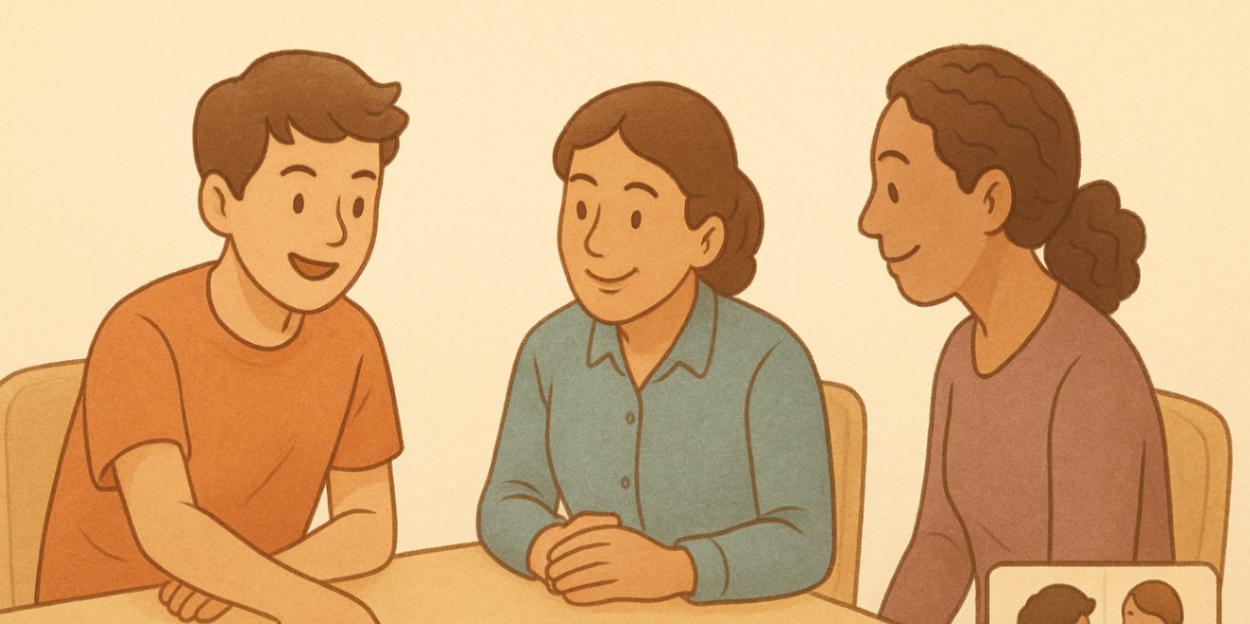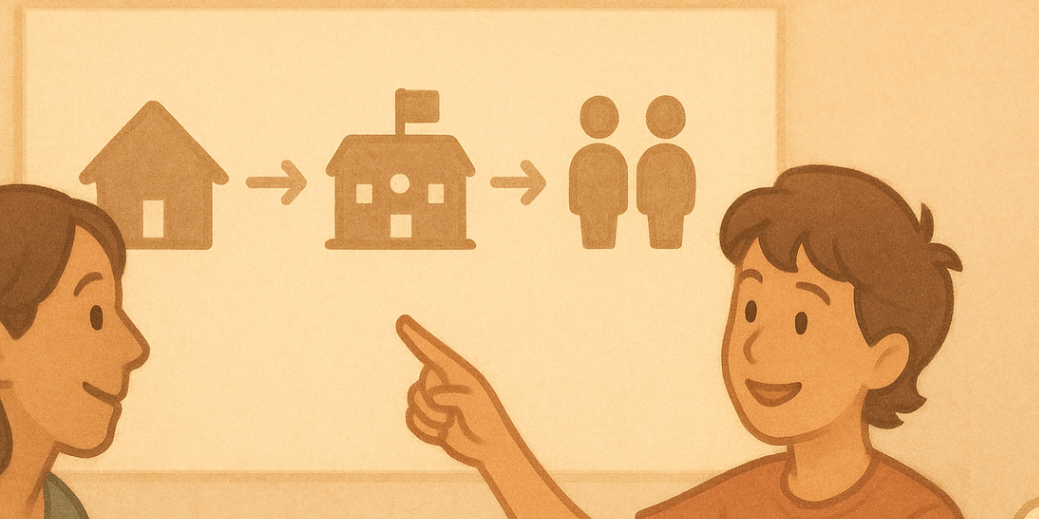
understanding behaviour therapy for teenagers: a parent’s guide
4 September, 2025
Navigating adolescence can feel like a rollercoaster for both you and your teen. One moment they are your loving child, and the next, they are pushing for independence in ways that can be confusing and challenging. These behavioural shifts are a normal part of growing up. Understanding why they happen and how to respond is key to supporting the mental health of young people. This guide explores how your support can adapt as your child grows, ensuring a healthy transition through these transformative years.
Key Highlights
-
Pushing boundaries is a natural part of the journey to independence for young people.
-
The challenges of adolescence are often linked to brain development, where impulse control matures slower than reward-seeking areas.
-
Positive parenting, focusing on open communication and clear rules, is vital for adolescent mental health.
-
It's important to distinguish between typical teen behaviour and warning signs that require professional support.
-
Behaviour therapies like cognitive behavioural therapy (CBT) can effectively help teens manage their actions and emotions.
-
Family support is the foundation for helping teenagers navigate this complex stage of life successfully.
Understanding Behavioural Changes in Teenagers

As your child enters their pre-teen and teenage years, you'll likely notice significant shifts in their behaviour. This isn't just them being difficult; it's a profound developmental phase driven by changes in parts of the brain. These changes explain why young people can be passionate and imaginative but also moody and impulsive.
Understanding this biological basis is the first step in navigating the challenges of adolescence. It helps you see their behaviour not as a personal attack but as a part of their growth. Next, we’ll look at these developmental stages more closely and learn to tell the difference between typical teen actions and those that might signal deeper mental health problems.
Developmental Stages from Childhood to Adolescence
The journey from childhood to young adulthood is marked by a powerful drive for independence. During adolescence, your child will naturally test boundaries and experiment with new ideas. This is essential for them to develop their own identity separate from family members.
This shift is heavily influenced by how their brain develops. According to the “dual systems model” of brain development, the reward-seeking regions of the brain mature faster than the parts of the brain responsible for self-regulation and impulse control. This imbalance explains why teens might act impulsively or seem more focused on social rewards than on potential risks.
As a result, you may see a mix of behaviours: creativity and passion one day, moodiness and unpredictability the next. These changes, while sometimes challenging, are a fundamental part of their path toward becoming a responsible adult.
Typical Versus Concerning Behaviours
How do you know if your teen's behaviour is just a phase or something more serious? It's crucial to distinguish between typical boundary-pushing and signs of potential mental health problems. An appropriate response depends on understanding this difference.
While some disrespectful behaviour can be common, persistent defiance or aggression might be a red flag. Setting clear rules about how you treat each other helps your teen understand expectations. For example, saying, "We speak respectfully in our family," establishes a clear, fair standard.
Look for patterns and significant changes from their usual self. Here are some examples to help you tell the difference:
-
Typical: Moodiness and irritability. Concerning: Persistent sadness, withdrawal from friends and hobbies.
-
Typical: Wanting more privacy. Concerning: Extreme secrecy, especially about potentially risky activities.
-
Typical: Disagreeing with you. Concerning: Constant, intense anger or physical aggression.
Common Behavioural Challenges in Pre-Teens and Teens
The teenage years often bring a host of new behavioural challenges that can test any parent's patience. Issues like disrespectful communication, sibling fights, peer influence, and risk-taking are common concerns for families with young people. These behaviours are partly a result of their developing brains and their need to forge their own path.
While these actions are a normal part of growing up, they require guidance. Understanding the root causes of mood swings and impulsivity can help you respond more effectively and support your teen’s adolescent mental health.
Mood Swings and Emotional Outbursts
If you're dealing with frequent mood swings and emotional outbursts, you're not alone. These are hallmarks of the teenage years, largely due to hormonal changes and the ongoing development of the brain's emotional centres. Your teen isn't trying to be difficult; they are often struggling to manage intense feelings they don't fully understand.
Coping with these ups and downs requires patience and a calm approach. Instead of reacting with anger, try to listen and validate their feelings, even if you don't agree with their behaviour. This helps build their emotional intelligence and shows them how to manage emotions constructively. According to researcher Roger Kobak, parents who can "attend, listen, empathise and respond" foster trust and more open communication
Creating a stable and supportive home environment gives them a safe space to experience these emotions. By modelling calm responses, you teach them valuable skills for regulating their feelings, which is crucial for their long-term mental health.
Risk-Taking and Impulsivity
Risk-taking is an important way for teenagers to learn about their limits and develop independence. This might look like trying new tricks at the skate park or joining a new club. However, the same impulsivity that fuels positive exploration can also lead to more concerning behaviours.
Due to their still-developing brains, teens may overvalue the immediate rewards of an activity and undervalue the long-term risks. This can result in dangerous actions like truancy, substance use, or unsafe sexual behaviour. These aren't necessarily signs of a compulsive disorder, but they do require a thoughtful response.
You can help your teen learn to assess risks by talking openly about your family's values and keeping lines of communication open. Channeling their desire for new experiences into positive, supervised activities like sports, drama, or music can also provide a healthy outlet for their energy and support their adolescent mental health.
Early Warning Signs for Needing Behavioural Support

While many teenage behaviours are normal, some changes can be early warning signs of underlying mental health problems. It's important to trust your instincts. If you feel something is off with your child’s behaviour, it’s worth paying closer attention.
Significant shifts in their attitude, combined with other changes like extreme mood swings, withdrawal from friends, or a sudden drop in school performance, might indicate a need for behavioural support. Recognising these red flags early allows you to get your teen the help they need before problems escalate.
Recognising Red Flags in Adolescent Behaviour
Knowing what red flags to look for can make a significant difference in your teen's adolescent mental health. It’s not about any single incident but a pattern of behaviour that represents a marked change for your child. A sudden withdrawal from activities they once loved or a dramatic shift in their friend group could be a sign of trouble.
These behaviours don't automatically mean your teen has a compulsive disorder or other serious issue, but they do warrant a conversation. Try to talk to your child about what’s going on. If their behaviour continues to worry you, it may be time to consider mental health services.
Here is a table to help you distinguish between typical behaviour and potential red flags:
|
Behaviour Area |
Typical Teen Behaviour |
Potential Red Flag |
|---|---|---|
|
Mood |
Occasional moodiness or irritability. |
Persistent sadness, anxiety, or rage that lasts for weeks. |
|
Social Life |
Shifting friend groups; wanting more time with peers. |
Complete withdrawal from friends and family; isolation. |
|
School |
A slight dip in grades or occasional missed homework. |
A sharp drop in performance; frequent truancy. |
|
Interests |
Developing new hobbies and dropping old ones. |
Losing interest in all activities they used to enjoy. |
When to Consider Professional Intervention
If you’ve noticed persistent red flags and your conversations with your teen aren’t helping, it may be time to consider professional intervention. Seeking help is a sign of strength and a powerful way to support your child. You don’t have to handle this alone.
Start by talking to people you trust, such as your family GP or your child’s school counsellor. They can provide initial guidance and refer you to appropriate mental health services. A child psychologist or behaviour therapist is trained to help adolescents navigate complex emotional and behavioural challenges.
Consider seeking professional support if:
-
Your teen’s behaviour poses a risk to themselves or others.
-
Their struggles are significantly impacting their daily life, including school, friendships, and family relationships.
-
Your efforts to help at home haven’t led to any improvement.
The Role of Families in Behavioural Change

As family members and carers, you are the most important influence in your teen’s life. Creating a home environment built on warm relationships and consistent support is one of the most effective ways to guide their behaviour. Even when they push you away, they still need your love and encouragement.
Establishing clear family rules and maintaining open lines of communication help your teen feel secure as they navigate their growing independence. Your role is to provide a stable foundation from which they can confidently explore the world.
Building Open Communication
Strong, open communication is the bedrock of a healthy parent-teen relationship. It’s a key part of the process of building a secure attachment that lasts into adulthood. When your teen feels they can talk to you without judgment, they are more likely to come to you with their problems.
Actively listening—giving them your full attention—shows that you value their thoughts and feelings. This doesn't mean you have to agree with everything they say, but it does mean you respect them enough to hear them out. This approach fosters mutual respect and makes difficult conversations easier for all family members.
To encourage open communication, try these strategies:
-
Actively listen: Pay full attention to their words and body language.
-
Share your feelings: Use "I" statements, like "I feel worried when..." instead of "You always..."
-
Choose your moment: Plan difficult conversations for a time when you’re both calm.
-
Take them seriously: Respect their developing ideas and opinions.
Setting Healthy Boundaries and Expectations
While open communication is vital, so are healthy boundaries. Clear rules and expectations provide the structure teens need to feel safe while exploring their independence. These rules help them learn to manage their behaviour and take responsibility for their actions, which is essential for their long-term adolescent mental health.
Involving your teen in creating family rules can make a big difference. When they feel the rules are fair and they’ve had a say, they are more likely to follow them. This process also teaches them negotiation and problem-solving skills.
Consistency is key. When a rule is broken, follow through with a calm, fair, and previously agreed-upon consequence. This reinforces your expectations and teaches them that their choices have outcomes. This reliable structure helps build respect and strengthens your relationship. A study on parental control found that clear guidance helps adolescents develop positive coping strategies.
Encouraging Positive Behaviour in Teens
Focusing on positive behaviour can be more effective than constantly correcting negative actions. A positive approach built on praise and encouragement can be a powerful source of motivation for your teen. Even though they may not show it, they still crave your approval.
When you notice and acknowledge their responsible choices, you reinforce that behaviour and strengthen your connection. This doesn't mean ignoring problems, but it does mean shifting the focus toward building them up. Let’s explore how praise and consequences work together to foster positive habits.
Praise, Motivation, and Natural Consequences
Praise is a powerful tool for motivation. When you catch your teen doing something right, tell them. Be specific with your praise, as this shows you’re paying attention. For example, instead of a simple "good job," try, "I really appreciate you helping with the dishes without being asked." This kind of descriptive praise encourages them to repeat the positive behaviour.
At the same time, a positive approach includes using natural consequences. When a rule is broken, the consequence should be logical and related to the behaviour. This isn't about punishment but about teaching responsibility. An appropriate response helps them understand the real-world impact of their actions.
Here’s how to balance these two elements:
-
Praise effort, not just results: Acknowledge when they try hard, even if they don't succeed.
-
Use consequences as a teaching tool: If they miss curfew, the consequence could be an earlier curfew next time.
-
Stay calm and consistent: Deliver both praise and consequences without excessive emotion.
Positive Parenting Techniques for Respectful Relationships
Positive parenting is all about building respectful relationships through connection and encouragement. One of the most powerful tools you have is being a positive role model. Your teen learns how to handle stress, communicate respectfully, and solve problems by watching you. When you model the behaviour you want to see, your words carry much more weight.
Another key technique is to choose your battles. Not every issue is worth a conflict. By letting the small things go, you save your energy for the boundaries that truly matter. This reduces negative interactions and creates more space for positive connection.
Spending enjoyable time together, respecting their need for privacy, and keeping your promises all contribute to a relationship bank account. By making regular "deposits" of trust and support, you build a strong foundation that can withstand the inevitable "withdrawals" from arguments and disagreements.
Behaviour Therapy Approaches for Teenagers
Multiple methods exist for effectively addressing mental health challenges during the teenage years. Cognitive Behavioral Therapy (CBT) is a popular choice, focusing on reshaping negative thought patterns and behaviors. Additionally, Dialectical Behavior Therapy (DBT) offers skills for emotional regulation, which can greatly enhance emotional intelligence. Group sessions provide a supportive environment where young people can share their experiences, reinforcing a sense of connection. Family involvement is crucial; clear rules and warm relationships can encourage teenagers to communicate openly while addressing issues like substance use or anxiety, fostering healthier coping strategies.
Specialist Services and Professional Support
If you decide to seek professional help, a wide range of specialist services is available to support you and your teen. You can start with an initial consultation with your GP or a school counsellor, who can help you find the right path. They can refer you to a child psychologist, a behaviour therapist, or other mental health services in your area.
Don't hesitate to reach out for support. Many organisations also offer a helpline for parents seeking advice or a listening ear. Finding the right professional support can provide your teen with new tools and your family with a renewed sense of hope.
When to Seek a Child Psychologist or Behaviour Therapist
Deciding to contact a child psychologist or behaviour therapist is a significant step toward getting your teen the right support. You should consider this option when your teen's behaviour is causing significant distress to them or your family, or when it's negatively impacting their ability to function at school or with friends.
A consultation with one of these specialists can provide a formal assessment to understand the root of the behavioural issues. A child psychologist can diagnose and treat a range of mental health conditions, while a behaviour therapist focuses on implementing practical strategies to change specific negative behaviours.
These professionals offer evidence-based interventions and provide a safe, non-judgmental space for your teen to talk. They can also work with you as parents, offering guidance on how to best provide professional support at home. Accessing these mental health services can be a game-changer for your family.
Conclusion
Navigating teenage behaviour can be overwhelming, but with the right understanding and support, families can make this stage a positive turning point. By recognising developmental changes early, setting clear boundaries, and encouraging healthy communication, parents can create an environment where teenagers feel understood and supported.
At daar, our experienced and NDIS-registered practitioners provide tailored behavioural support strategies designed to help both parents and adolescents. Seeking professional guidance is not a sign of weakness—it’s a proactive step toward empowering your teenager with the tools they need to thrive.
If you’re ready to explore personalised support for your teenager, book your consultation now and let our specialists guide you toward a stronger, healthier family dynamic.
Frequently Asked Questions
What’s the Difference Between Normal Teen Behaviour and Behaviour That Needs Help?
Normal teen behaviour includes moodiness and a desire for independence. Behaviour that may need help involves persistent, extreme changes like deep sadness, social withdrawal, or dangerous risk-taking that significantly disrupts their daily life. These could be signs of underlying mental health problems and warrant a conversation with a professional.
Which Therapeutic Approaches Work Best for Teen Behaviour Challenges?
Cognitive Behavioural Therapy (CBT) is excellent for helping teens change negative thought patterns that drive behaviour. Dialectical Behaviour Therapy (DBT) is particularly effective for those struggling with intense emotions, teaching skills in mindfulness and emotional regulation. The best behaviour therapy depends on the teen’s specific needs.
How Can Parents Cope with the Ups and Downs of Raising Teens?
Parents can cope by maintaining warm relationships, practicing open communication, and setting clear boundaries. Offering consistent encouragement while also taking care of your own well-being is crucial. Remember to be patient with your teen and yourself, and don't hesitate to seek support from other family members or professionals.
.svg)

















